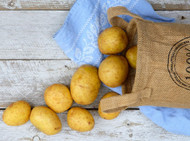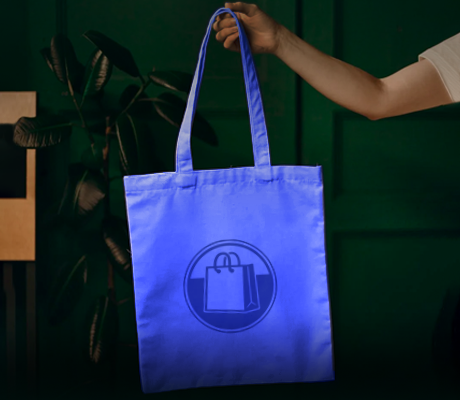The Benefits of Choosing Jute Bags
Posted by Julie Rotuno on 30th Nov 2022
Is your brand environmentally conscious? If so, you probably take care to reduce, reuse and recycle as frequently as possible.
Your emphasis on green practices means that you probably also are looking for a way to package your products that is more sustainable. If that packaging also is attractive, durable, and versatile, then so much the better.
Jute bags may be exactly what you are looking for. Made out of a sturdy vegetable fiber, jute bags are a natural, sustainable alternative to plastic bags.
Let's learn more about jute bags. Then, you'll want to get in touch with Mid-Atlantic Packaging to order a supply of custom jute bags for your brand. Mid-Atlantic Packaging is your number-one source for boxes, bags, and everything else you need to store, ship, and sell your products.
What Is Jute?
Jute comes from a completely natural source, namely, a plant that grows in tropical environments found in countries such as Bangladesh and India. The plant is long and shiny, and it lends itself particularly well to being spun into durable, coarse threads.
Jute is strong, easy to produce, and completely biodegradable. This makes them the perfect material for manufacturing all sorts of goods, including shopping bags. Because this material is so hard-wearing, it can even be used to make things like rugs, cushions, and laundry baskets.
Jute is second only to cotton in its popularity and versatility. It is the second most common fiber grown in crops around the globe, and it requires less water to grow than cotton does. Moreover, growers do not need to rely on pesticides and fertilizers to grow jute, making it a tremendously eco-friendly crop.
This is a major selling point for many brands that are dedicated to cultivating a greener identity, which is becoming increasingly critical with consumers. If you want to find ways to make your bags and boxes more sustainable, just contact Mid-Atlantic Packaging.
Producing Jute
Producers obtain jute from the bark of a plant called Corchorus capsularis, commonly called white jute. Harvests are conducted once or twice per year after a four-month growing season.
Most fibers are between one and four meters long. Farmers cut the stems, bundle them in packs, and then soak them in water to help loosen and separate the fibers. After soaking, the outer covering is scraped away and the softened fibers are pulled out of the jute stem. Next, the fibers are processed into threads so that they can be woven together to make the cloth that ultimately becomes jute bags and other common household items.
Jute frequently is referred to as the "Golden Fiber" because of its color and sheen. Some even say that jute has earned this nickname because of its cash value and versatile functionality. Approximately 90 percent of the world's jute is grown in Bangladesh, but it also is grown and harvested in Myanmar, Nepal, India, and Pakistan.
Why Choose Jute Bags?
It turns out that there are many benefits to choosing jute bags. These may include:
- Greater sustainability
- Recyclability
- Biodegradable
- Strength
- Durability
- Affordability
If you are looking for a more sustainable option for your brand's bags, then you can't go wrong with jute. It is possible for most farmers to grow jute crops throughout the year, harvesting approximately every six months. This means that a new harvest is always on the horizon.
Moreover, jute requires a relatively small parcel of land on which to grow. Thanks to characteristics such as these, jute can be grown without completely destroying the local ecosystem. That means that more land is left undisturbed, which slows down the rate of deforestation.
People further love that jute bags are completely recyclable and biodegradable. When customers are done using these bags, they readily can be recycled or even placed in a compost bin. On average, jute requires between one and two years to biodegrade. Then, it can be used to fertilize a garden. Of course, this is only after the bag has been used dozens of times.
Additionally, jute is a strong and durable material. Thanks to their increased robustness, jute bags can be used again and again, and they can carry heavier loads than bags made out of other materials. Customers can rest assured that the bottom won't fall out of their jute bag, nor do they have to be worried by thoughts of the handles snapping off. These definitely are sturdy shopping bags.
It's also worth mentioning that jute bags are breathable. People can easily carry things like fresh produce in them without worrying about spoiling the contents.
Just as critically, jute bags are affordable. This can be an especially crucial consideration if your brand is a start-up and your budget is tight. Jute bags are a cost-effective alternative that will differentiate your brand from the competition. Moreover, most consumers love the idea of an attractive and reusable shopping bag.
Jute Bags Are Fashionable
Did you know that jute bags actually are trendy? If you want your brand to make a marketing splash, then jute bags may be the best possible choice. Consumers absolutely love the clean, eco-friendly look of the simple jute bag.
Part of the reason why jute bags are so popular is that they are available in many shapes and sizes. You can select a small version for carrying tiny, precious items or a larger version for packaging fine bottles of wine. With many sizes and configurations available, it is possible to acquire jute bags for your brand that are perfectly matched to your products.
Once customers start receiving these bags, they are bound to be delighted. They will want to use them again and again on all of their shopping trips. That translates to free advertising for your brand. People are bound to ask your customers where they got that great tote bag made of jute, and that means that they will be discussing your brand without you having to spend an additional penny.
In fact, many people carry jute shopping bags as a way to express their personality and outlook on life. A simple jute bag can make a huge statement about the carrier's opinions and beliefs. Your brand's bag could be a big part of that.
Customize to Make an Impact
Of course, the best way to make an impact with your jute bags is to have them customized. Most customers prefer to keep things simple, perhaps printing their logo or name on the bag and letting the beauty of the bag speak for itself.
The options are numerous when it comes to customization. Just ask Mid-Atlantic Packaging about how jute bags can be personalized to reflect your brand's identity. These jute bags could become the centerpiece of your business' new marketing campaign.
Better for the Environment
If your brand is looking for a packaging alternative to plastic, then jute is the ideal answer. Simply put, jute actually is good for the environment.
Some of that benefit is derived from jute's versatility. The core of the plant, called the hurd, is woody, and it has numerous uses for commercial and industrial applications. In fact, it can be used as an alternative to wood. Experts suggest that the jute hurd is capable of meeting much of the world's demand for wood products.
There are other reasons why jute is such an outstanding material for making grocery and tote bags. Some of these reasons relate to the ecological benefits of the plant itself. For instance, jute crops:
- Grow easily and quickly
- Require remarkably little land when compared with other crops;
- Absorb unusually large amounts of carbon dioxide from the earth's atmosphere
- Slow the progression of deforestation
How can one humble crop achieve all of that? Jute seems to do it with ease. Since it requires little land for cultivation, more land can be preserved as a natural habitat for the local ecosystem. Plus, scientists estimate that a single hectare of a crop of jute absorbs as much as 15 tons of carbon dioxide during an approximately 100-day growing season. At the same time, the plants release approximately eleven tons of oxygen into the atmosphere.
It further is worth noting that many producers of jute fiber continue to use a natural, water-based process to extract the fibers from the plant. This is a more environmentally friendly practice, but it has additional benefits.
In countries such as Bangladesh and India where unemployment numbers tend to be very high, this hands-on, labor-intensive process of producing jute fibers is a boon to the local economy. Many people can be employed year-round to grow the crop, produce the fibers and weave the necessary cloth.
As you can see, jute bags are beneficial for the people who make the material, the companies that use the bags and the customers who ultimately receive them.
Order Your Jute Bags from Mid-Atlantic Packaging
For several decades, Mid-Atlantic Packaging has worked hard to bring its customers the most diverse and desirable selection of packaging alternatives. These include boxes, bags, and many other options.
Jute bags are among our most popular offerings. In recent years, they have become particularly hot sellers as brands and consumers have become more aware of questions of sustainability, recycling, and biodegradability.
Jute bags handily meet all of these requirements. These crops grow with remarkable speed and require little interference from farmers. Nonetheless, they produce a bumper crop twice per year and ensure strong employment numbers for the local economy.
Jute bags are strong too. People can use them many times over the course of years. It's even possible to carry large or heavy objects in them. When the bags are no longer usable, it's a cinch to recycle them. Alternatively, they can be cast into a compost bin to eventually become garden fertilizer.
It's hard to imagine a better alternative than jute for tote bags. If your brand wants to make a statement about its commitment to the environment and make a huge impact from a marketing standpoint, then jute is the clear answer.
If you are ready to inquire about customizing jute bags for your brand, contact Mid-Atlantic Packaging to get a custom quote.



